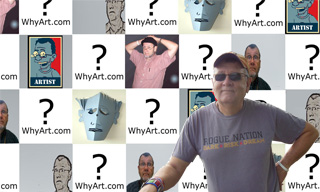Join Me at the Intersection of Art, Technology and Learning
What Does He Want, Daddy?....AKA, A day for Doctor King...
I remember asking the question at a picnic in our yard; my family was new in the area and had invited families whose fathers worked with my dad to enjoy a summer barbeque. We were all listening to music on the radio when the hourly newscast interrupted the party conversation with a report on Dr. Martin Luther King, Jr., who was leading a civil rights protest in a neighboring state. I turned to my father and said, "What does Dr. King want, daddy"?
I asked the question as a way to
insinuate myself into the adults' conversation, which seemed very
different and so exotic to my eight year old sensibilities.
And, I was ready with a follow up opinion, one designed to garner
adult approval; that is what I really wanted. What I said then was Dr.
King should not be making trouble for people, he should be content
with the same rights we all enjoyed.
I really didn't know that was precisely why Dr. King was
demonstrating, but I knew what the adults at the party thought about
demonstrators and that was my access point to their conversation.
My mom was from central California and my dad was an upstate New York kid who had been job-transplanted from the west coast to the rural south. My younger brother and I were along for the ride. We had lived in a number of rural communities with folks who were as likely to speak Spanish or Portuguese as English, and we had no experience with Jim Crow laws and segregation. When we arrived in Georgia, I found the "White's Only" drinking fountains confusing...I thought the signs referred to the color of the porcelain water fixtures! But I began to notice the signs everywhere...on rest room doors and cafe windows...and swimming pools on hot summer days. I began to wonder why the black children who lived on the other side of the fence didn't go to my school, or even come over the fence to play. I wondered, too, why I was told not to cross over there. I hadn't connected any of it with Dr. King's message at first, but I began to wonder.
Years passed. Thank goodness Dr. King had more sense than a clueless little white boy and didn't stop marching...or speaking out! He moved throughout the south, and into the north, too. His words and actions were in stark contrast to what he encountered, but he did not wander from his message of non-violence and brotherhood. He even kept marching after we got a new president.
I liked our new president right from the start: he was Irish, Catholic, and he was young. My kind of guy. But not everyone's. I found that out when we moved to New Orleans in the late summer of 1963. There were placards and posters all over the city... KO the Kennedy's in bright red ink. There were angrier words, too. They said our president was an outsider and a troublemaker, just like Dr. King.
I finally understood Dr. King's message when I took a bus downtown. A few stops after we boarded, the bus got crowded. Soon, it was standing room only. At the next stop, an elderly black woman got on and eased her way down the aisle. She took a place in front of me. She looked tired. I stood up and offered her my seat. The white people on the bus looked at me with surprise, and anger. I'm sure many thought, "What kind of a white person gives a seat to a Negro"? ...or something even worse.
That didn't bother me as much as what happened next, though. The elderly woman wouldn't sit down! She was afraid of the angry faces on the bus. She might have even been afraid of me, as if my gesture was a cruel joke and not an act of kindness. I looked around at the faces on the bus, and offered her the seat a second time. She hesitated, then accepted. I don't think either of us found the ride restful.
How sad to live in a world of fear and self imposed limits. How wonderful to have a man like Dr. King face those fears and challenge those limits, so that all COULD enjoy the same rights. And, how glorious to have the words he wrote and spoke live on to inspire the generations which followed his own.
My father and I have talked about Dr. King many times in the decades following that summertime barbeque. The conversations, especially the earlier ones, have not always been pleasant. I have grown to treasure Dr. King's words as well as his leadership. My dad remains troubled by his actions, even as he accepts the validity of their intent. A gift for me is seeing the commonality in the actions of my father and the elderly black woman riding on that New Orleans bus in 1963. Black or white, we can be paralyzed by false opinions. Black or white, truth will set us free.
Dr. Martin Luther King, Jr. Center



